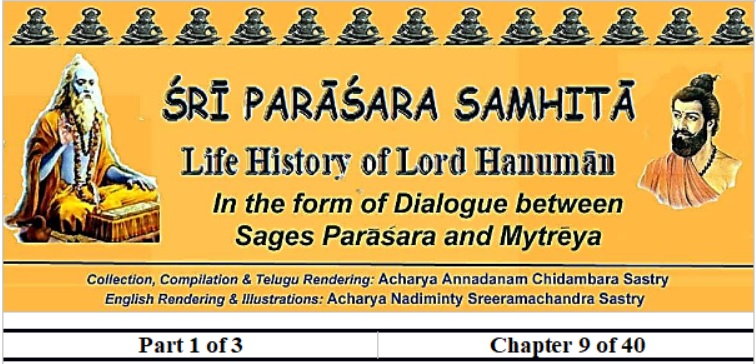
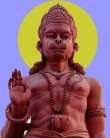
9th Chapter (Navama Paţalah)
“The History of Dhwajadatta (2)”
(Dhwajadatta Caritam -2)
मैत्रेय:
किमकार्षीद्वनं गत्वा ध्वजदत्त: पराशर
तद्वनं वा किमाख्यातं?-तन्मे ब्रूहि महमुने!।। 1
Mytrēya:
“Oh! Sage Parāśara! What did Dhwajadatta do after going into the forest?. What is the name of that forest? Kindly tell me the same.
श्रीपराशर:
तद्वनं नैमिषारण्यं यत्रास्ते पुष्करो मुनि:
यत्र संति मुनिव्राता अपरे कश्यपादय:।। 2
Parāśara:
Oh! Mytrēya! That is Naimiśa frorest. Sage Puşkara was was in it. Also that is the place where Kaśyapa and other great sages live.
जपंतो भव्यमंत्रांश्च ध्यायंतश्चेष्टदेवता:
प्रायशो हनुमद्भक्ता: तन्मंत्रजपतत्परा:।। 3
Those that live there always recite auspicious mantras. They worship the gods and goddesses they liked. Often there used to be Hanumān devotees reciting Hanumanmantra regularly.
नित्यहोमपरा: केचित् काम्यहोमपरा: परे
अन्ये कर्मपरित्यक्ता: केवलध्यानतत्परा:।। 4
Some were busy in performing the regular fire sacfricfice (nityahōma), some others the dsire-specific fire sacrifice (kāmyahōma), while others were engrossed only in meditation (dhyāna) leaving all other actions.
इत्येवं विविधैव्र्याप्तं बहुभिर्मुनिपुंगवै:
ध्वजदत्तो वनं वीक्ष्य विस्मयं परमं ययौ।। 5
Dhwajadatta was surprised to see that forest full of so many great sages engaged in such divergent activities.
दंतधावनपर्णानि समित्पुष्पफलानि च
गृहीत्वा निजपाणिभ्यां प्रविष्टो वनगह्वरम्।। 6
He entered the forest holding teeth-cleansing herbals, sacrificial firewood splinters, flowers and fruits in hands.
यत्रास्ते पुष्करो योगी हनुमद्ध्यानतत्पर:
सूर्यबिंबसमज्योति: हनुमन्मन्त्रवैभवात्।।
तं देशमगमद्दीप्तं शनैर्भीतो महात्मन:
तूष्णीं तस्थौ तदभ्यासे विस्मृतस्वार्थसंभ्रमा।। 7
He reached the divine place where the philosopher (yōgi) Puşkara, who was always deep in meditation on Hanumān, who shines like Sun because of the influence of Hanumanmantra, but he (Dhwajadatta) hesitated to talk to that great soul forgetting the urgency of his work.
यदृच्छया मुनींद्रो पि माध्याह्निकमुपासितुम्
निवृत्तयोगस्तत्रैवं निवृत्तस्स्वांतरात्मन:।। 8
Puşkara himself, in connection with midday worship, casually stopped yoga, even retrieving his soul away from the meditation and opened his eyes.
ध्वजदत्तो महाप्राज्ञ: वीक्षमाणे महामुनौ
उपहारं निवेद्यादौ साष्टांगं प्रणतो भवत्।। 9
As Puşkara looked at him, the very wise Dhwajadatta presented him the gifts brought by him and respectfully prostrated at his feet.
अथाब्रवीन्महाभागो ध्वजदत्तं द्विजोत्तमम्
किमर्थमागतो ब्रह्नान्! केन वा पकृतो भवान्! 10
Then Puşkara said so to the Dhwajadatta, the best among the Brāhmin people, “Oh! Great man! Oh Brāhmin! What brings you here? Has anyone harmed you?
निर्विण्णवदनो भूत्वा चिंताक्रांत इव स्थित:
एतत्सर्वं यथापृष्ट: विचार्य बू्रहि तत्त्वत:।। 11
Tell me the whole thing that turned you sad and ashen faced.
श्रुत्वा तद्वचनं विप्र: पुष्करस्य महात्मन:
प्रत्युत्तरं यथान्याय्यं वक्तुं समुपचक्रमे।। 12
Having heard the words of that great soul Puşkara the Brāhmin Dhwajadatta narrated his true story.
कुण्डिनं नाम नगरं आसीत् त्रैलोक्यविश्रुतम्
यत्राढ्या वणिजो नित्यं कुबेराधिकसंपद:।। 13
Dhwajadatta to Puşkara
“There is a city called Kundina, well-known in the three worlds. In that city, there are tradesmen (vaiśyas) possessing more wealth than Lord Kubēra (god of wealth).
ब्राह्माणाश्चापि विद्वांस: सुरराजगुरूपमा:
नित्यान्नदाननिरता: नित्यं होमपरायणा:।। 14
There the Brāhmin are as wise as the wise sage Brihaspti. They always gifted food. They performed fire sacrifice regularly.
स्त्रिय: पतिव्रतास्सर्वा: शूद्रा ब्राह्माणसेवका:
क्षत्रिया धर्मयोद्धारो न क्वचिद्वर्णसंकर:।। 15
Women of that place are very faithful wives. All people respect Brāhmins. The warrier class people (kştriyas) fight only in righteous wars. People of all traditional professions live together peacefully.
नाभूदविद्वान् य: को पि नावादकुशलस्तथा
नाषडंगविदत्रासीत् नायज्वा तत्र पट्टणे।। 16
There is none in that town who is not a scholar, not a good speaker, does not know the six subparts of Vēda (şdañga) or does not perform fire sacrifices (yagñya).
एवं सर्वसमृद्धे स्मिन् ध्वजशर्मा बहुश्रुत:
बह्वृचो गाग्र्यगोत्रश्च जितांतर्बाह्माशत्रव:।। 17
There lived in that richly endowed citywas Dhwajaśarma, belonging to the Gargya clan (gōtra), who was all-knowing (sarvgñya), adept in the Vēdas, and winner over inner and outward enemies like desire, anger etc.
तस्या हं ज्येष्ठपुत्रश्च कनीयान् मम भद्रक:
तस्या नुजो भद्रबाहु: सर्वे वेदपरायणा:।। 18
I am his eldest son. The one next to me is Bhadraka. Next to him by birth is Bhadrabāhu. All of us studied the Vēdas.
अनुजौ तौ महापुर्यां उपादानपरायणौ
तेषां ममापि पुत्त्रास्ते नालं क्षुत्क्षांतये! मुने।। 19
My two younger brothers are teaching in the city. I also have children, Oh! Great sage! But I do not have life of sufficiency to keep hunger at bay.
पुत्रा मे बहवस्सन्ति साध्वी भार्या प्रियंवदा
उपादानार्जितं धान्यं नालं ग्रासाय मे मुने।। 20
I have many sons. My wife is very nice, speaks gently and nicely; but the rice we get by my teaching work is insufficient for our food.
शाकाहारेण सा साध्वी जीवनं कुरुते भृशम्
उपवासपराप्राया शाकाभावे पतिव्रता।। 21
That best of women is living on just green leaves. Often, that devout wife fasts when even the green vegetable are not available.
तद्दैन्यदर्शनादेव-कदाचिदतिचिंतित:
आश्वास्य तां प्रियैर्वाक्यै: वंचयित्वा हमागत: 22
My Lord! I saw her pitiable state once, felt very sad, somehow deceiving her with sweet words I came here.
तस्माह्रुर्भिक्षहन्तारं सर्वसौभाग्यदायकम्
सर्वदु:खहरं चा पि-ह्रुपायं वक्तुमर्हसि।। 23
Hence, please tell me a way of ridding this destitution and every grief and getting all riches.
बहुना त्र किमुक्तेन? ममैतद्वचनं त्रृणु
दारिद्रयसागरे मग्नानस्मानुद्धारयिष्यसि।। 24
Why to tell so many things? Please listen this one, Please help us get out of the deep ocean of poverty into which we have fallen.”
इत्युक्त्वा ध्वजदत्तस्तु-पादयोर्निपपात ह
तस्य तद्वचनं श्रुत्वा-दयाद्र्रमनसो मुने:
न्यपतत्प्रणतस्यांगे नेत्राभ्यामश्रुर्बिन्दव:
हनूमंत्ं ह्र्दि ध्यात्वा धैर्यमास्थाय पुष्कर:
ध्वजदत्तं समुत्थाप्य मा भैषीरिति चाब्रवीत्।। 25
Saying so Dhwajadatta fell on the feet of Puşkara. Hearingn his pathetic story, tears fell from the eyes of Puşkara on the prostrate person. Quietly praying Hanumān for a while, he lifted Dhwajadatta and assured him not to worry.
अस्त्यनर्थपरीहार-समर्थो हनुमान् प्रभु:
वर्तते हनुमन्मंत्र:-दैन्यं किन्नु? द्विजोत्तम्! ।। 26
Puşkara teaches Hanumanmantra to Dhwajadatta
He further said, “Oh! Good Brahmin! Hanumān is there to drive away all the troubles. There is also a Hanumanmantra to invoke Him. Then why is this despair.
दैवतानि कति सन्ति न भूमौ
नैव तानि मनसो मतानि मे
वीक्षितं जडदरिद्ररक्षणे
दैवतं हनुमदाख्यमेव यत्।। 27
How many Gods are worshipped? But I do not accept them all heartfully. The only God intent on protecting the unwise and destitute people is Lord Hanumān.
मंत्रजालमपि नान्यगोचरम्
रोचते कमपि मंत्रकं विना
कारणं किमतिरिक्तमत्र नो
वायुनंदनं मनो:परिग्रहात्।। 28
I am not fond of other mantras. An expert Guru in mantras has to impart all of them. But there are no other need if Hanumanmantra is obtained.
ब्रह्मविष्णुशिवदेवतागणा:
कार्यसिद्धिशिथिलोद्यमो मुहु:
अंजनासुतमनुप्रभावतो
भुंजते सुखमहर्निशं द्विज! ।। 29
Oh! Brahmin! Once unable to obtain results by taking up other mantras, Brahma, Vişņu, Śiva, Sītā, Gauri took up Hanumanmantra and remained happy for ever.
तद् विलोक्य भवते मनूत्तमम्
कार्यसिद्धिविषये दृढव्रतम्
दानपात्रसुधिये दिशाम्यहम्
पुण्यतीर्थसलिले विगाह्नाताम्।। 30
There is the best mantra that fructifies all actions is available. You are most appropriate for tht mantra. I will impart that mantra to you. Take a ritual bath at the sacred waters and come.”
इत्थमाह वचनं मनोरमम्
ब्राह्मणं भृशदरिद्रशेखरम्
नित्यकर्मनिधयो मुनीश्वरा:
पुण्यतीर्थमविशन्सहा मुना।। 31
So said Puşkara to the destitute Dhwajadatta. Along with Dhwajadatta, the other sages too entered the sacred water as part of their routine regular oblations.
यत्र सिद्धिमगमन्मुनीश्वरा:
स्नानपानहतकिल्विषा: क्षणात्
तत्र पुण्यसलिले द्विजस्स्वयम्
स्नानपूर्वकं विधिं चकार वै।। 32
There where all the sages became sinless due via bath and drinking, Dhwajadatta himself too performed his ritualistic oblations.
स्नात्वा तु पुष्करश्शीघ्रं पुण्यतीर्थोदके शुभे
कृतमाध्याह्निकायाथ ध्वजदत्ताय धीमते।। 33
Puşkara too quickly took bath in that holy water, completed his mid-day auspicious rituals, and to the well behaved Dhwajadatta
सुवचर्लसमेतश्रीहनमुन्मंत्रमत्तमम्
द्वादशाक्षरविद्येति प्रसिद्धं जगतां त्रये
हनुमद्ध्यानमास्थाय ध्यात्वा गुरुपदांबुजम्
विन्यस्य मस्तके हस्तं विप्रायोपादिदेश ह।। 34
Ritually taught the Suvarcchalāsamētahanumanmantra (the mantra of Hanumān along with Suvarcchala) that is popular as the 12-lettered (dwādaśākşara) mantra, all the while, meditating on Hanamān, meditating on his Guru’s lotus feet and keeping his palm on the head of the good Brāhmin Dhwajadatta.
ध्वजदत्तो महामंत्रमुपदिष्टं महर्षिणा
अत्यादरेण जग्राह निक्षेपं निर्धनो यथा।। 35
Dhwajadatta accepted great mantra taught by Puşkara as respectfully as a destitute accepts a treasure trove.
ततो नियममास्थाय जजाप हनुमन्मनुम्
गुरूपदिष्टविधिना तत्र पुण्यजलांतरे।। 36
Then Dhwajadatta started reciting the great mantra exactly as the Guru taught at that very pious pilgrimage centre.
उपदिश्य महामंत्रं पुष्करो पि महामुनि:
ध्वजदत्ताय विप्राय जगामाश्रममात्मन:।। 37
Great sage Puşkara having so imparted that mantra to Dhwajadatta left for his hermitage.
स्वावेक्षणोत्सुकलसन्मुखकृष्णनागा…
प्त्याशासितात्महितलोभखगेंद्रनाथाम्
आसादिता तिथिबिलप्रकरांगणाग्रा
मध्यास्त पुष्करमुनिर्निजपर्णशालाम्।। 38
Puşkara reached his hermitage, the courtyard of which was full of guests waiting to meet him, black cobras (kalanaga) with shining faces waiting to see him and great eagles (garuda) that are heralding his greatness.
इति श्रीपराशरसंहितायां श्रीपराशरमैत्रेयसंवादे ध्वजदत्तचरित्रकथनं नाम नवम: पटल:
Thus ends the 9th Chapter, entitled “The History of Dhwajadatta (2)” of Śrī Parāśara Samhitā
Devanagari transliteration

Click here to visit the Contents of the Part 1.
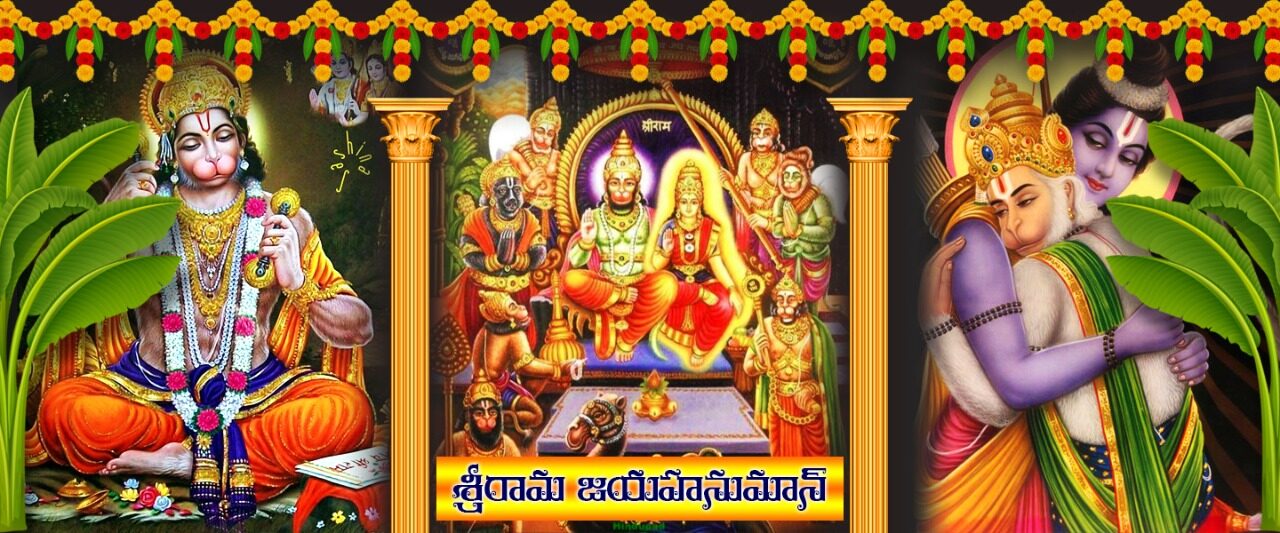

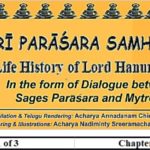
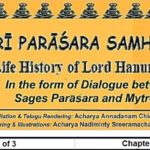
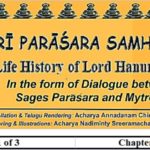
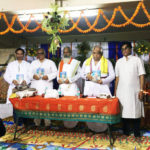
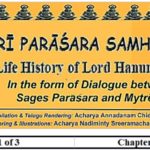
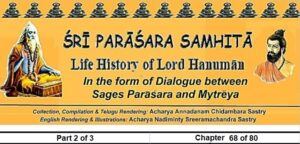
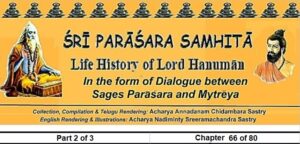
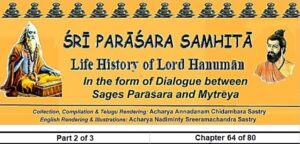
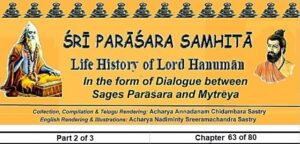
Be First to Comment